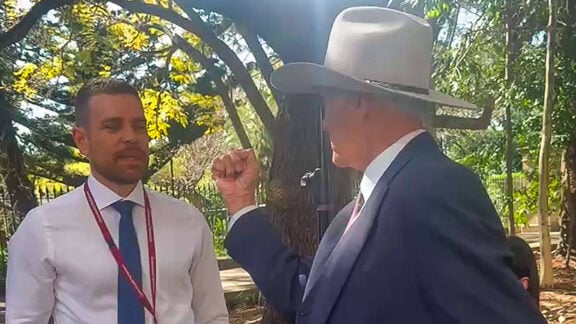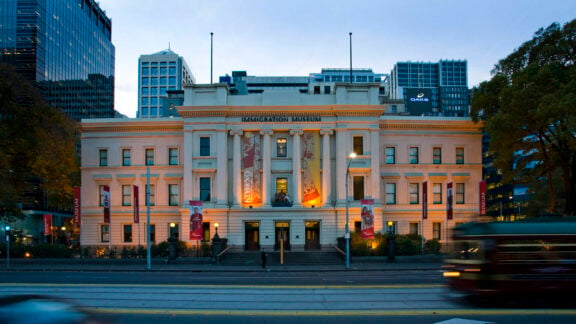Over a decade ago, I was asked to chair a meeting between the then visiting Greek Minister for Tourism and various travel agents in Melbourne. The meeting was organised in haste, at the direction of the Minister, and she could barely conceal her scorn and fury when she realised that the five travel agents in the room, rather than being high powered purveyors of mass tourism, were merely small suburban operators, hardly worth her attention. In an aside, she was shocked that there seemed to be no contact between the Greek state through its representatives in Australia and the Australian tourism market. When I asked what steps had been undertaken by the Ministry of Tourism or the Greek National Tourism Organisation to establish a presence and foster relevant contacts in Melbourne, she stormed off in a huff, deprived of her photo opportunity, as the travel agents had already scoffed down the nibblies provided and scurried back to their offices, their lunch break being over.
That scene, farcical though it was, characterises the complacency and indifference that has continued to define the way Athens promotes itself and manages its image in Australia, as well as its dealings with the Greek diaspora.
The Greek government appears to be abusing the generosity and goodwill of the Greek Community of Melbourne. For years, the GOCMV has offered an initially rent-free space in the very heart of Melbourne to the Greek National Tourist Organisation, but also the moral and symbolic prestige of hosting an institution that could have become a genuine bridge between Greece and the diaspora. The fact that the GOCMV, an organisation funded and sustained by the toil of migrants and their descendants, has been willing to bear such costs in order to advance the interests of Greece is in itself remarkable. While Athens vacillates, it is the GOCMV that demonstrates vision and a commitment to Greece’s future by creating opportunities that Greece itself appears unwilling to seize.
In March of this year, in a letter addressed to the President of the GCM, Bill Papastergiadis, the Secretary General of the GNTO, Mr Andreas Fiorentinos, assured the community that “the process for the selection and placement of an executive, who will assume the position of Head of the Office is underway and is expected to be completed shortly.” In the same letter he acknowledged that “your provision of space in the Greek Centre building in Melbourne to host the offices of the Greek National Tourism Organisation (GNTO) Australia Abroad Office and the opportunity you offer for two years of free use of the facilities is crucial for the launch of its operation.” Such words confirm that Athens is fully aware of the extent of the GOCMV’s generosity, yet they also underline the stark contrast between the community’s willingness to act and the government’s chronic reluctance to do so.
This pattern reflects a wider malaise. From consulates across Australia that remain chronically understaffed and unable to serve the basic needs of citizens abroad, to the inept handling of matters vital to the diaspora, respect for the institutions of the Greek state has sunk to an all time low among Greeks in Melbourne. The patience of the community is running out, for promises are no substitute for delivery.
The financial implications are serious. By holding space for years while waiting for a government decision that never arrives, the GOCMV has endured direct economic loss and forgone other opportunities that could have advanced its mission. And yet it continues to persevere. That it is prepared to absorb this burden testifies to the depth of its attachment to Greece and its determination to foster Hellenic interests, even when Greece herself appears indifferent. Few other communities abroad would continue to subsidise a state that repeatedly declines to reciprocate.
Meanwhile, the Australian tourism market remains a prize of immense value. In 2019, a record 339,000 Australians travelled to Greece, spending approximately €371 million. Even in 2023, with numbers still recovering after the pandemic, around 289,000 Australians visited, spending over €460 million, which amounts to one of the highest per capita expenditures among all Greece’s long haul markets. On average, Australians spend nearly two weeks in Greece, with per person expenditure exceeding €1,500. These figures reveal a market with extraordinary potential. Yet Greece has no active tourism office in Melbourne to cultivate it. The ineptness of the Greek government in failing to establish and promote its own tourism office undermines the goodwill of the diaspora and results in a tangible loss of income for Greece itself.
At the same time, Australia’s travellers are being courted vigorously by competitors. Australians are equally inclined to choose Turkey, Croatia or Malta, all of which have invested heavily in sophisticated advertising campaigns. Turkish promotional material is omnipresent across print and online media, while Greek advertising is virtually invisible in Australia. Without a comparable presence, Greece places itself at a severe disadvantage in an increasingly competitive market.
The challenge is intensified by the realities of assimilation. The first generations of Greek Australians travelled frequently to Greece because of their families and emotional ties. As younger generations grow more integrated into Australian society, those links diminish. Visits based on nostalgia or familial duty can no longer be relied upon. Unless Greece develops a marketing strategy that speaks to the experiences and aspirations of younger Greek Australians, it cannot assume that travel to Greece will remain a priority.
Equally squandered is the potential of the diaspora itself to serve as a living network of ambassadors. No advertising campaign, however sophisticated, can replicate the authenticity of word of mouth promotion offered by members of a diaspora community. Greek Australians possess credibility, personal networks, and the ability to translate heritage into contemporary experiences for their peers. They are in an ideal position to promote Greece in schools, universities, businesses, and social organisations. The GOCMV, through its festivals, lectures, and cultural initiatives, has already created the framework for such promotion. Yet without official support, resources, or structured initiatives, this vast reservoir of goodwill remains underutilised.
Melbourne itself offers Greece a strategic opportunity that few destinations enjoy. As home to one of the largest Greek communities outside Greece, it provides a natural hub for tourism promotion. It is a city that celebrates multicultural identity, stages annual festivals dedicated to Greece, and boasts a density of Greek organisations unmatched outside Europe. The GOCMV has long recognised this and has repeatedly sought to provide the infrastructure that Greece itself has failed to deliver. The failure of Athens to capitalise on Melbourne’s position is not merely negligence; it is an abdication of responsibility.
The absence of a functioning GNTO office in Melbourne also carries costs in the world of business-to-business tourism. Tourism promotion is not confined to attracting individual travellers. It includes negotiating with airlines, cruise operators, and travel companies to ensure that Greece is included in packages, itineraries, and promotional showcases. Without a GNTO representative lobbying in Australia, opportunities for new direct flights are lost, partnerships with major travel agents remain undeveloped, and Greece’s presence at international tourism expos is diminished. Each of these omissions translates into fewer Australian visitors and diminished economic returns.
The problem extends further to the question of seasonality. Australian travellers can most easily holiday in December, January, and February, a period when northern European visitors are scarce and much of Greece lies dormant. A creative and targeted campaign could present Greece as a winter destination, highlighting cultural tourism, gastronomy, and island experiences outside the high season. The GOCMV has provided the physical base for just such a campaign, yet without the active presence of a Greek government office to occupy it, the idea remains unfulfilled.
Underlying all of this is the perception that Athens takes its diaspora for granted. In multicultural Australia, where ethnic groups actively compare the attention paid to them by their ancestral homelands, this is dangerous. Communities see Turkey investing heavily in cultural and tourism promotion, Croatia cultivating strong institutional links, and Italy maintaining a constant presence. Greece, by contrast, appears absent. The message received is one of detachment, and detachment is corrosive.
There is also a deeper truth about the nature of the diaspora itself. Melbourne’s Greek community is still relatively young and continues to hold the Greek state in esteem for reasons that are emotional and sentimental. Yet this generosity of spirit will not endure indefinitely. Successive generations will no longer extend the same forbearance, nor will they afford Greece the same symbolic loyalty. Respect must be earned through competence, reciprocity, and presence, otherwise it will dissipate. That the GOCMV continues to advocate for Greek interests despite repeated rebuffs from Athens is testimony to its foresight. The question is how long such patience can last before it too is exhausted.
Despite a member of the GOCMV remarking that the behaviour of the Greek government has become “Byzantine,” history reminds us that the Byzantines, for all their complexity, managed to get things done. By contrast, the way Athens is proceeding now suggests a state in danger of sinking under its own sloth and inaction. Delegations will always be found for ceremonial occasions such as the 25 March national day celebrations, where photo opportunities abound and the trappings of patriotism provide a convenient stage and a free holiday. Yet when it comes to establishing a permanent and meaningful presence in Melbourne that would serve both Greece and the diaspora, the will evaporates.
Unless Athens understands that diaspora goodwill is a finite resource, it risks irreparably damaging its standing among communities abroad and squandering an unprecedented opportunity to strengthen Greece’s presence in one of the world’s most dynamic economies. The GOCMV has shown that it is prepared to carry Greece’s interests when Greece herself refuses to do so, but the time has come for Athens to act, for without action the bond between Greece and her children in Melbourne will steadily lose its meaning.









